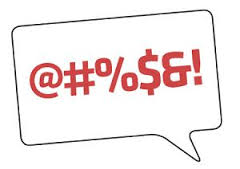expletive
英 [ɪkˈspliː.tɪv]
美 [ˈek.splə.t̬ɪv]
- adj. 附加的;填补的
- n. 填补物;咒骂语
星级词汇:

记忆方法
将“expletive”分解为“ex”和“pletive”。记住“ex”通常意味着“出”、“完全”,而“pletive”可以联想到“complete”的结尾部分。想象一些完全不适合公开的言语或词被“出”来,用以强化其不文明或粗鲁的性质,从而帮助记忆“expletive”意为骂人的话或禁忌语。
以上内容由AI生成, 仅供参考和借鉴
中文词源
expletive 咒骂语
ex-, 向外。-ple, 满的,词源同full, fulfill. 即拿出去的,后用来指不便刊印的脏话,咒骂语。
英语词源
- expletive
-
expletive: [17] Originally, an expletive word was simply one used to ‘fill up’ a line of verse, to complete its metrical pattern (expletive comes from Latin explētus, the past participle of explēre ‘fill out’, a compound formed from the prefix ex- ‘out’ and plēre ‘fill’, source of English complete and related to English fill).
Hence the term came to be used for a redundant word, not contributing anything to the meaning of the sentence: “The Key my loose, powerless fingers forsook”, a lame and expletive way of saying “I dropt the key”, Robert Southey 1804. The first recorded example of its euphemistic application as a noun to ‘profanities’ is by Sir Walter Scott in Guy Mannering 1815: ‘retaining only such of their expletives as are least offensive’.
=> complete, full - expletive (n.)
- 1610s, "a word or phrase serving to fill out a sentence or metrical line," from Middle French explétif (15c.) and directly from Late Latin expletivus "serving to fill out," from explet-, past participle stem of Latin explere "fill out, fill up, glut," from ex- "out" (see ex-) + plere "to fill" (see pleio-).
Sense of "an exclamation," especially "a curse word, an oath," first recorded 1815 in Sir Walter Scott, popularized by edited transcripts of Watergate tapes (mid-1970s), in which expletive deleted replaced President Nixon's salty expressions. As an adjective, from 1660s. - expletive (adj.)
- mid-15c., in grammar, "correlative," from Latin expletivus "serving to fill out" (see expletive (n.)).
权威例句
- 1. It is a " damned human race " in a not merely expletive sense.
- 那是 “ 倒霉的人类 ”,这样说并非只是感叹的意思.
- 2. I mean, I just about ( expletive ) in my pants.
- 我的意思是, 我只是在说 ( 咒骂 ) 我的裤子.
- 3. We're not going to take this ( expletive ) any more.
- 我们不能再他妈这样下去了.
- 4. Please take your seats and shut the ( expletive ) up.
- 请你们入座,还有收声 ( 咒骂语 ) 了.
- 5. Expletive - laced language filled her head.
- 各种脏话塞进她的头部.
